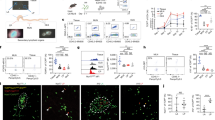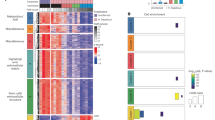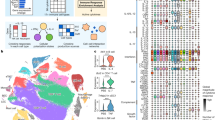Abstract
Pancreatic ductal adenocarcinoma (PDAC) is characterized by a high degree of inflammation and profound immune suppression. Here we identify Yes-associated protein (Yap) as a critical regulator of the immunosuppressive microenvironment in both mouse and human PDAC. Within Kras:p53 mutant pancreatic ductal cells, Yap drives the expression and secretion of multiple cytokines/chemokines, which in turn promote the differentiation and accumulation of myeloid-derived suppressor cells (MDSCs) both in vitro and in vivo. Pancreas-specific knockout of Yap or antibody-mediated depletion of MDSCs promoted macrophage reprogramming, reactivation of T cells, apoptosis of Kras mutant neoplastic ductal cells and pancreatic regeneration after acute pancreatitis. In primary human PDAC, YAP expression levels strongly correlate with an MDSC gene signature, and high expression of YAP or MDSC-related genes predicts decreased survival in PDAC patients. These results reveal multifaceted roles of YAP in PDAC pathogenesis and underscore its promise as a therapeutic target for this deadly disease.
This is a preview of subscription content, access via your institution
Access options
Subscribe to this journal
Receive 50 print issues and online access
$259.00 per year
only $5.18 per issue
Buy this article
- Purchase on Springer Link
- Instant access to full article PDF
Prices may be subject to local taxes which are calculated during checkout








Similar content being viewed by others
References
Siegel RL, Miller KD, Jemal A . Cancer statistics, 2015. CA Cancer J Clin 2015;65: 5–29.
Hruban RH, Adsay NV, Albores-Saavedra J, Compton C, Garrett ES, Goodman SN et al. Pancreatic intraepithelial neoplasia: a new nomenclature and classification system for pancreatic duct lesions. Am J Surg Pathol 2001; 25: 579–586.
Bardeesy N, Sharpless NE, DePinho RA, Merlino G . The genetics of pancreatic adenocarcinoma: a roadmap for a mouse model. Semin Cancer Biol 2001;11: 201–218.
Jaffee EM, Hruban RH, Canto M, Kern SE . Focus on pancreas cancer. Cancer Cell 2002; 2: 25–28.
Ryan DP, Hong TS, Bardeesy N . Pancreatic adenocarcinoma. N Engl J Med 2014; 371: 1039–1049.
Schutte M, Hruban RH, Geradts J, Maynard R, Hilgers W, Rabindran SK et al. Abrogation of the Rb/p16 tumor-suppressive pathway in virtually all pancreatic carcinomas. Cancer Res 1997; 57: 3126–3130.
Aguirre AJ, Bardeesy N, Sinha M, Lopez L, Tuveson DA, Horner J et al. Activated Kras and Ink4a/Arf deficiency cooperate to produce metastatic pancreatic ductal adenocarcinoma. Genes Dev 2003; 17: 3112–3126.
Brembeck FH, Schreiber FS, Deramaudt TB, Craig L, Rhoades B, Swain G et al. The mutant K-ras oncogene causes pancreatic periductal lymphocytic infiltration and gastric mucous neck cell hyperplasia in transgenic mice. Cancer Res 2003;63: 2005–2009.
Grippo PJ, Nowlin PS, Demeure MJ, Longnecker DS, Sandgren EP . Preinvasive pancreatic neoplasia of ductal phenotype induced by acinar cell targeting of mutant Kras in transgenic mice. Cancer Res 2003; 63: 2016–2019.
Hingorani SR, Petricoin EF, Maitra A, Rajapakse V, King C, Jacobetz MA et al. Preinvasive and invasive ductal pancreatic cancer and its early detection in the mouse. Cancer Cell 2003; 4: 437–450.
Tuveson DA, Zhu L, Gopinathan A, Willis NA, Kachatrian L, Grochow R et al. Mist1-KrasG12D knock-in mice develop mixed differentiation metastatic exocrine pancreatic carcinoma and hepatocellular carcinoma. Cancer Res 2006; 66: 242–247.
Hingorani SR, Wang L, Multani AS, Combs C, Deramaudt TB, Hruban RH et al. Trp53R172H and KrasG12D cooperate to promote chromosomal instability and widely metastatic pancreatic ductal adenocarcinoma in mice. Cancer cell 2005;7: 469–483.
Feig C, Gopinathan A, Neesse A, Chan DS, Cook N, Tuveson DA . The pancreas cancer microenvironment. Clin Cancer Res 2012; 18: 4266–4276.
Bayne LJ, Beatty GL, Jhala N, Clark CE, Rhim AD, Stanger BZ et al. Tumor-derived granulocyte-macrophage colony-stimulating factor regulates myeloid inflammation and T cell immunity in pancreatic cancer. Cancer Cell 2012; 21: 822–835.
Clark CE, Hingorani SR, Mick R, Combs C, Tuveson DA, Vonderheide RH . Dynamics of the immune reaction to pancreatic cancer from inception to invasion. Cancer Res 2007; 67: 9518–9527.
Khaled YS, Ammori BJ, Elkord E . Increased levels of granulocytic myeloid-derived suppressor cells in peripheral blood and tumour tissue of pancreatic cancer patients. J Immunol Res 2014; 2014: 879–897.
Kurahara H, Takao S, Maemura K, Mataki Y, Kuwahata T, Maeda K et al. M2-polarized tumor-associated macrophage infiltration of regional lymph nodes is associated with nodal lymphangiogenesis and occult nodal involvement in pN0 pancreatic cancer. Pancreas 2013; 42: 155–159.
Porembka MR, Mitchem JB, Belt BA, Hsieh CS, Lee HM, Herndon J et al. Pancreatic adenocarcinoma induces bone marrow mobilization of myeloid-derived suppressor cells which promote primary tumor growth. Cancer Immunol Immunother 2012; 61: 1373–1385.
Pylayeva-Gupta Y, Lee KE, Hajdu CH, Miller G, Bar-Sagi D . Oncogenic Kras-induced GM-CSF production promotes the development of pancreatic neoplasia. Cancer Cell 2012; 21: 836–847.
Zeng L, Guo Y, Liang J, Chen S, Peng P, Zhang Q et al. Perineural invasion and TAMs in pancreatic ductal adenocarcinomas: review of the original pathology reports using immunohistochemical enhancement and relationships with clinicopathological features. J Cancer 2014; 5: 754–760.
Zhao F, Obermann S, von Wasielewski R, Haile L, Manns MP, Korangy F et al. Increase in frequency of myeloid-derived suppressor cells in mice with spontaneous pancreatic carcinoma. Immunology 2009; 128: 141–149.
Parker KH, Beury DW, Ostrand-Rosenberg S . Myeloid-derived suppressor cells: critical cells driving immune suppression in the tumor microenvironment. Adv Cancer Res 2015; 128: 95–139.
Lu T, Ramakrishnan R, Altiok S, Youn JI, Cheng P, Celis E et al. Tumor-infiltrating myeloid cells induce tumor cell resistance to cytotoxic T cells in mice. J Clin Invest 2011; 121: 4015–4029.
Stromnes IM, Brockenbrough JS, Izeradjene K, Carlson MA, Cuevas C, Simmons RM et al. Targeted depletion of an MDSC subset unmasks pancreatic ductal adenocarcinoma to adaptive immunity. Gut 2014; 63: 1769–1781.
Zhu Y, Knolhoff BL, Meyer MA, Nywening TM, West BL, Luo J et al. CSF1/CSF1R blockade reprograms tumor-infiltrating macrophages and improves response to T-cell checkpoint immunotherapy in pancreatic cancer models. Cancer Res 2014; 74: 5057–5069.
Zhang W, Nandakumar N, Shi Y, Manzano M, Smith A, Graham G et al. Downstream of mutant KRAS, the transcription regulator YAP is essential for neoplastic progression to pancreatic ductal adenocarcinoma. Sci Signal 2014; 7: ra42.
Kapoor A, Yao W, Ying H, Hua S, Liewen A, Wang Q et al. Yap1 activation enables bypass of oncogenic Kras addiction in pancreatic cancer. Cell 2014;158: 185–197.
Shao DD, Xue W, Krall EB, Bhutkar A, Piccioni F, Wang X et al. KRAS and YAP1 converge to regulate EMT and tumor survival. Cell 2014; 158: 171–184.
Hugo W, Shi H, Sun L, Piva M, Song C, Kong X et al. Non-genomic and immune evolution of melanoma acquiring MAPKi resistance. Cell 2015; 162: 1271–1285.
Kim MH, Kim J, Hong H, Lee SH, Lee JK, Jung E . Actin remodeling confers BRAF inhibitor resistance to melanoma cells through YAP/TAZ activation. EMBO J 2015; 35: 462–478.
Lin L, Sabnis AJ, Chan E, Olivas V, Cade L, Pazarentzos E et al. The Hippo effector YAP promotes resistance to RAF- and MEK-targeted cancer therapies. Nat Genet 2015; 47: 250–256.
Lowenfels AB, Maisonneuve P, Cavallini G, Ammann RW, Lankisch PG, Andersen JR et al. Pancreatitis and the risk of pancreatic cancer. International Pancreatitis Study Group. N Engl J Med 1993; 328: 1433–1437.
Munigala S, Kanwal F, Xian H, Scherrer JF, Agarwal B . Increased risk of pancreatic adenocarcinoma after acute pancreatitis. Clin Gastroenterol Hepatol 2014;12: 1143–1150 e1141.
Jensen JN, Cameron E, Garay MV, Starkey TW, Gianani R, Jensen J . Recapitulation of elements of embryonic development in adult mouse pancreatic regeneration. Gastroenterology 2005; 128: 728–741.
Carriere C, Young AL, Gunn JR, Longnecker DS, Korc M . Acute pancreatitis markedly accelerates pancreatic cancer progression in mice expressing oncogenic Kras. Biochem Biophys Res Commun 2009; 382: 561–565.
Carriere C, Young AL, Gunn JR, Longnecker DS, Korc M . Acute pancreatitis accelerates initiation and progression to pancreatic cancer in mice expressing oncogenic Kras in the nestin cell lineage. PLoS One 2011; 6: e27725.
Morris JPt, Cano DA, Sekine S, Wang SC, Hebrok M . Beta-catenin blocks Kras-dependent reprogramming of acini into pancreatic cancer precursor lesions in mice. J Clin Invest 2010; 120: 508–520.
Bhatia M . Apoptosis versus necrosis in acute pancreatitis. Am J Physiol Gastrointest Liver Physiol 2004; 286: G189–G196.
Katoh H, Watanabe M . Myeloid-derived suppressor cells and therapeutic strategies in cancer. Mediators Inflamm 2015; 2015: 159269.
Gabitass RF, Annels NE, Stocken DD, Pandha HA, Middleton GW . Elevated myeloid-derived suppressor cells in pancreatic, esophageal and gastric cancer are an independent prognostic factor and are associated with significant elevation of the Th2 cytokine interleukin-13. Cancer Immunol Immunother 2011; 60: 1419–1430.
Markowitz J, Brooks TR, Duggan MC, Paul BK, Pan X, Wei L et al. Patients with pancreatic adenocarcinoma exhibit elevated levels of myeloid-derived suppressor cells upon progression of disease. Cancer Immunol Immunother 2015; 64: 149–159.
Plouffe SW, Hong AW, Guan KL . Disease implications of the Hippo/YAP pathway. Trends Mol Med 2015; 21: 212–222.
Lechner MG, Liebertz DJ, Epstein AL . Characterization of cytokine-induced myeloid-derived suppressor cells from normal human peripheral blood mononuclear cells. J Immunol 2010; 185: 2273–2284.
Mace TA, Ameen Z, Collins A, Wojcik S, Mair M, Young GS et al. Pancreatic cancer-associated stellate cells promote differentiation of myeloid-derived suppressor cells in a STAT3-dependent manner. Cancer Res 2013; 73: 3007–3018.
Marigo I, Bosio E, Solito S, Mesa C, Fernandez A, Dolcetti L et al. Tumor-induced tolerance and immune suppression depend on the C/EBPbeta transcription factor. Immunity 2010; 32: 790–802.
Obermajer N, Muthuswamy R, Odunsi K, Edwards RP, Kalinski P . PGE(2)-induced CXCL12 production and CXCR4 expression controls the accumulation of human MDSCs in ovarian cancer environment. Cancer Res 2011; 71: 7463–7470.
Obermajer N, Wong JL, Edwards RP, Odunsi K, Moysich K, Kalinski P . PGE(2)-driven induction and maintenance of cancer-associated myeloid-derived suppresor cells. Immunol Invest 2012; 41: 635–657.
Phan VT, Wu X, Cheng JH, Sheng RX, Chung AS, Zhuang G et al. Oncogenic RAS pathway activation promotes resistance to anti-VEGF therapy through G-CSF-induced neutrophil recruitment. Proc Natl Acad Sci USA 2013;110: 6079–6084.
Sinha P, Clements VK, Fulton AM, Ostrand-Rosenberg S . Prostaglandin E2 promotes tumor progression by inducing myeloid-derived suppresor cells. Cancer Res 2007; 67: 4507–4513.
Sinha P, Okoro C, Foell D, Freeze HH, Ostrand-Rosenberg S, Srikrishna G . Proinflammatory S100 proteins regulate the accumulation of myeloid-derived suppresor cells. J Immunol 2008; 181: 4666–4675.
Strauss L, Sangaletti S, Consonni FM, Szebeni G, Morlacchi S, Totaro MG et al. RORC1 regulates tumor-promoting "Emergency" granulo-monocytopoiesis. Cancer Cell 2015; 28: 253–269.
Zhang Y, Liu Q, Zhang M, Yu Y, Liu X, Cao X . Fas signal promotes lung cancer growth by recruiting myeloid-derived suppressor cells via cancer cell-derived PGE2. J Immunol 2009; 182: 3801–3808.
Zhao X, Rong L, Li X, Liu X, Deng J, Wu H et al. TNF signaling drives myeloid-derived suppressor cell accumulation. J Clin Invest 2012; 122: 4094–4104.
Acharyya S, Oskarsson T, Vanharanta S, Malladi S, Kim J, Morris PG et al. A CXCL1 paracrine network links cancer chemoresistance and metastasis. Cell 2012; 150: 165–178.
Tsou CL, Peters W, Si Y, Slaymaker S, Aslanian AM, Weisberg SP et al. Critical roles for CCR2 and MCP-3 in monocyte mobilization from bone marrow and recruitment to inflammatory sites. J Clin Invest 2007; 117: 902–909.
Wang G, Lu X, Dey P, Deng P, Wu CC, Jiang S et al. Targeting YAP-dependent MDSC infiltration impairs tumor progression. Cancer Discov 2016; 6: 80–95.
Noy R, Pollard JW . Tumor-associated macrophages: from mechanisms to therapy. Immunity 2014; 41: 49–61.
Mok S, Koya RC, Tsui C, Xu J, Robert L, Wu L et al. Inhibition of CSF-1 receptor improves the antitumor efficacy of adoptive cell transfer immunotherapy. Cancer Res 2014; 74: 153–161.
Falk LA, Vogel SN . Comparison of bone marrow progenitors responsive to granulocyte-macrophage colony stimulating factor and macrophage colony stimulating factor-1. J Leukoc Biol 1988; 43: 148–157.
Kitamura T, Qian BZ, Soong D, Cassetta L, Noy R, Sugano G et al. CCL2-induced chemokine cascade promotes breast cancer metastasis by enhancing retention of metastasis-associated macrophages. J Exp Med 2015; 212: 1043–1059.
Lacey DC, Achuthan A, Fleetwood AJ, Dinh H, Roiniotis J, Scholz GM et al. Defining GM-CSF- and macrophage-CSF-dependent macrophage responses by in vitro models. J Immunol 2012; 188: 5752–5765.
Li X, Yao W, Yuan Y, Chen P, Li B, Li J et al. Targeting of tumour-infiltrating macrophages via CCL2/CCR2 signalling as a therapeutic strategy against hepatocellular carcinoma. Gut 2015, e-pub ahead of print 9 October 2015 doi:10.1136/gutjnl-2015-310514.
Roca H, Varsos ZS, Sud S, Craig MJ, Ying C, Pienta KJ . CCL2 and interleukin-6 promote survival of human CD11b+ peripheral blood mononuclear cells and induce M2-type macrophage polarization. J Biol Chem 2009; 284: 34342–34354.
Sierra-Filardi E, Nieto C, Dominguez-Soto A, Barroso R, Sanchez-Mateos P, Puig-Kroger A et al. CCL2 shapes macrophage polarization by GM-CSF and M-CSF: identification of CCL2/CCR2-dependent gene expression profile. J Immunol 2014; 192: 3858–3867.
Xue J, Sharma V, Hsieh MH, Chawla A, Murali R, Pandol SJ et al. Alternatively activated macrophages promote pancreatic fibrosis in chronic pancreatitis. Nat Commun 2015; 6: 7158.
Alderson MR, Tough TW, Ziegler SF, Grabstein KH . Interleukin 7 induces cytokine secretion and tumoricidal activity by human peripheral blood monocytes. J Exp Med 1991; 173: 923–930.
Fahey TJ 3rd, Tracey KJ, Tekamp-Olson P, Cousens LS, Jones WG, Shires GT et al. Macrophage inflammatory protein 1 modulates macrophage function. J Immunol 1992; 148: 2764–2769.
Lindell DM, Standiford TJ, Mancuso P, Leshen ZJ, Huffnagle GB . Macrophage inflammatory protein 1alpha/CCL3 is required for clearance of an acute Klebsiella pneumoniae pulmonary infection. Infect Immun 2001; 69: 6364–6369.
Johnson R, Halder G . The two faces of Hippo: targeting the Hippo pathway for regenerative medicine and cancer treatment. Nat Rev Drug Discov 2014; 13: 63–79.
Calabro L, Morra A, Fonsatti E, Cutaia O, Amato G, Giannarelli D et al. Tremelimumab for patients with chemotherapy-resistant advanced malignant mesothelioma: an open-label, single-arm, phase 2 trial. Lancet Oncol 2013;14: 1104–1111.
Le DT, Lutz E, Uram JN, Sugar EA, Onners B, Solt S et al. Evaluation of ipilimumab in combination with allogeneic pancreatic tumor cells transfected with a GM-CSF gene in previously treated pancreatic cancer. J Immunother 2013; 36: 382–389.
Royal RE, Levy C, Turner K, Mathur A, Hughes M, Kammula US et al. Phase 2 trial of single agent Ipilimumab (anti-CTLA-4) for locally advanced or metastatic pancreatic adenocarcinoma. J Immunother 2010; 33: 828–833.
Johnson L, Mercer K, Greenbaum D, Bronson RT, Crowley D, Tuveson DA et al. Somatic activation of the K-ras oncogene causes early onset lung cancer in mice. Nature 2001; 410: 1111–1116.
Kawaguchi Y, Cooper B, Gannon M, Ray M, MacDonald RJ, Wright CV . The role of the transcriptional regulator Ptf1a in converting intestinal to pancreatic progenitors. Nat Genet 2002; 32: 128–134.
Olive KP, Tuveson DA, Ruhe ZC, Yin B, Willis NA, Bronson RT et al. Mutant p53 gain of function in two mouse models of Li-Fraumeni syndrome. Cell 2004;119: 847–860.
Surana R, Wang S, Xu W, Jablonski SA, Weiner LM . IL4 limits the efficacy of tumor-targeted antibody therapy in a murine model. Cancer Immunol Res 2014;2: 1103–1112.
Acknowledgements
We thank Drs T Jacks (MIT), DJ Pan (Johns Hopkins) and CV Wright (Vanderbilt) for producing and sharing the original mouse strains used in this study. We are grateful for the helpful suggestions and critical comments of our manuscript from Dr S Ostrand-Rosenberg (UMBC). We would also like to thank Dr Karen Creswell from the Flow Cytometry and Cell Sorting Shared Resource (FCSR) for her technical guidance. We appreciate the technical assistance from FCSR, Microscopy & Imaging Shared Resource (MISR), Histopathology & Tissue Shared Resource (HTSR) and Genomics & Epigenomics Shared Resource (GESR) at Lombardi Cancer Center Shared Resources. We thank the husbandry staff and technicians of the Division of Comparative Medicine (DCM) at Georgetown University for support in our animal studies. CY is supported by NIH (R01CA187090), the V Foundation and the Advocure foundation. LMW is the PI of NIH (R01CA50633), and Cancer Center Support Grant (CA051008) that also supports the Lombardi Cancer Center Shared Resources.
Author information
Authors and Affiliations
Corresponding author
Additional information
Supplementary Information accompanies this paper on the Oncogene website
Supplementary information
Rights and permissions
About this article
Cite this article
Murakami, S., Shahbazian, D., Surana, R. et al. Yes-associated protein mediates immune reprogramming in pancreatic ductal adenocarcinoma. Oncogene 36, 1232–1244 (2017). https://doi.org/10.1038/onc.2016.288
Received:
Revised:
Accepted:
Published:
Issue Date:
DOI: https://doi.org/10.1038/onc.2016.288
This article is cited by
-
Functional roles of SRC signaling in pancreatic cancer: Recent insights provide novel therapeutic opportunities
Oncogene (2023)
-
Epithelial and stromal co-evolution and complicity in pancreatic cancer
Nature Reviews Cancer (2023)
-
Spontaneously evolved progenitor niches escape Yap oncogene addiction in advanced pancreatic ductal adenocarcinomas
Nature Communications (2023)
-
The biology of YAP in programmed cell death
Biomarker Research (2022)
-
YAP/TAZ as master regulators in cancer: modulation, function and therapeutic approaches
Nature Cancer (2022)



